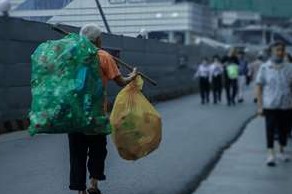 Eliminating single-use plastics by 2025
Eliminating single-use plastics by 2025
Since the mid-2000s, growing awareness of pollution and environmental degradation as long-term challenges has led China to take steps to reduce the use of plastic in many applications.In a joint policy document issued on January 16, 2020, the National Development and Reform Commission (NDRC) and the Ministry of Ecology and Environment announced an ambitious multi-phase national plan to reduce and eventually eliminate the use of certain single-use plastics.
The policy seeks to phase out non-degradable plastic bags, single-use straws and plastic utensils, single-use plastic items in hotels and plastic postal and courier packages over the five-year period from 2020 to the end of 2025.
The first phase of this plan took effect on January 1, 2021. Starting this year, restaurants are prohibited from providing single-use plastic straws and stores in major cities are prohibited from providing plastic shopping bags.
In the next phase, non-degradable plastic bags will be banned in other cities and towns by 2022; single-use plastic utensils will be banned for on-site dining nationwide by 2022; star-rated hotels nationwide will be prohibited from voluntarily providing single-use plastic items by 2022; and postal and courier services in Beijing, Shanghai, Jiangsu, Zhejiang, Fujian and Guangdong will be prohibited from using non-degradable plastic packaging bags by 2022. Additionally, the production of cosmetic products containing plastic microbeads will be banned by the end of 2022.
Under the NRDC plan, four previously-ubiquitous plastic products are banned from being produced or sold: 1) ultra-thin plastic shopping bags with a thickness of less than 0.25mm, 2) polyethylene agricultural mulching films with a thickness of less than 0.01 mm, and (3) single-use foam clamshells, and 4) plastic cotton swabs.
Market response: exiting plastics and seeking alternatives
These significant changes to China’s stance with regard to plastic have caused many companies to alter their business practices. AFRY China’s Yunlan Meng notes that “Some plastics companies have increased their research and development and investments in degradable plastics. New products also pay more attention to recyclability and reusability, which will help establish and improve the plastic products recycling system and help reduce plastic pollution.”
On the end user side, Meng says, “Many brands, retail, commercial and e-commerce platforms have also released strategic plans for their future sustainable development. They promise to reduce the use of plastics, use more biodegradable materials and green packaging, promote change from the demand side, and implement the corresponding plastic restriction orders.”
Businesses are also experimenting with various ways to reduce their plastic use through various measures, including avoiding excessive packaging; switching to reusable, recyclable and biodegradable alternatives, as well as shopping basket rentals.
Finally, consumers are changing their behaviour. “With the growing concern about environmental pollution, many consumers are gradually changing their behaviour patterns and, to a certain extent, they are willing to pay more for sustainable products,” observes Meng. This increased environmental awareness, along with the plastic bag ban in major cities, has led consumers to consciously use cloth shopping bags and to avoid disposable plastic tableware.
Increased demand for paper
China’s shift away from plastic has increased demand for fibre and paper-based products which can be renewable, degradable, compostable or recyclable products that continue to be allowed under current regulations. As a plastic alternative, fibre-based products are much more cost-effective than biodegradable plastics, the cost of which is three-to-five times the cost of traditional plastics.
“The plastic limit order means that fibre-based products have the opportunity to be more widely used,” says Meng. “As the best alternative to plastic, the plastic restriction order will accelerate the growth in demand for fibre-based products, including paper packaging and pulp moulded products, especially food cards, straw base paper, kraft paper, greaseproof paper, etc.,” Meng continues.
Most products use virgin wood pulp, so the demand for pulp will increase in the future. In addition, the plastic restriction order will also promote the growth of demand for corrugated cardboard. “Considering that China will officially implement the zero-import policy of waste-paper in 2021, pulp will be used to replace recycled fibre,” Meng believes.
As China’s plan to reduce reliance on plastics continues moving forward, Chinese businesses’ and consumers’ use of single-use plastic products should further decline. Simultaneously, the need for cost-effective plastic alternatives will make paper and fibre-products necessary for many segments of the economy.
